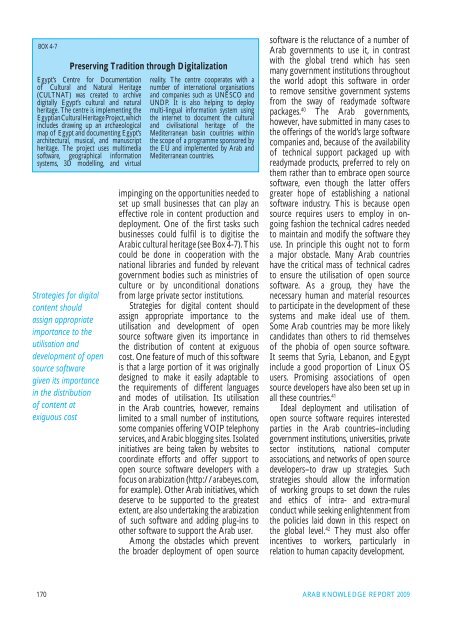Arab Knowledge Report 2009: Towards Productive
Arab Knowledge Report 2009: Towards Productive
Arab Knowledge Report 2009: Towards Productive
- No tags were found...
Create successful ePaper yourself
Turn your PDF publications into a flip-book with our unique Google optimized e-Paper software.
BOX 4-7Egypt’s Centre for Documentationof Cultural and Natural Heritage(CULTNAT) was created to archivedigitally Egypt’s cultural and naturalheritage. The centre is implementing theEgyptian Cultural Heritage Project, whichincludes drawing up an archaeologicalmap of Egypt and documenting Egypt’sarchitectural, musical, and manuscriptheritage. The project uses multimediasoftware, geographical informationsystems, 3D modelling, and virtualStrategies for digitalcontent shouldassign appropriateimportance to theutilisation anddevelopment of opensource softwaregiven its importancein the distributionof content atexiguous costPreserving Tradition through Digitalizationreality. The centre cooperates with anumber of international organisationsand companies such as UNESCO andUNDP. It is also helping to deploymulti-lingual information system usingthe internet to document the culturaland civilisational heritage of theMediterranean basin countries withinthe scope of a programme sponsored bythe EU and implemented by <strong>Arab</strong> andMediterranean countries.impinging on the opportunities needed toset up small businesses that can play aneffective role in content production anddeployment. One of the first tasks suchbusinesses could fulfil is to digitise the<strong>Arab</strong>ic cultural heritage (see Box 4-7). Thiscould be done in cooperation with thenational libraries and funded by relevantgovernment bodies such as ministries ofculture or by unconditional donationsfrom large private sector institutions.Strategies for digital content shouldassign appropriate importance to theutilisation and development of opensource software given its importance inthe distribution of content at exiguouscost. One feature of much of this softwareis that a large portion of it was originallydesigned to make it easily adaptable tothe requirements of different languagesand modes of utilisation. Its utilisationin the <strong>Arab</strong> countries, however, remainslimited to a small number of institutions,some companies offering VOIP telephonyservices, and <strong>Arab</strong>ic blogging sites. Isolatedinitiatives are being taken by websites tocoordinate efforts and offer support toopen source software developers with afocus on arabization (http://arabeyes.com,for example). Other <strong>Arab</strong> initiatives, whichdeserve to be supported to the greatestextent, are also undertaking the arabizationof such software and adding plug-ins toother software to support the <strong>Arab</strong> user.Among the obstacles which preventthe broader deployment of open sourcesoftware is the reluctance of a number of<strong>Arab</strong> governments to use it, in contrastwith the global trend which has seenmany government institutions throughoutthe world adopt this software in orderto remove sensitive government systemsfrom the sway of readymade softwarepackages. 40 The <strong>Arab</strong> governments,however, have submitted in many cases tothe offerings of the world’s large softwarecompanies and, because of the availabilityof technical support packaged up withreadymade products, preferred to rely onthem rather than to embrace open sourcesoftware, even though the latter offersgreater hope of establishing a nationalsoftware industry. This is because opensource requires users to employ in ongoingfashion the technical cadres neededto maintain and modify the software theyuse. In principle this ought not to forma major obstacle. Many <strong>Arab</strong> countrieshave the critical mass of technical cadresto ensure the utilisation of open sourcesoftware. As a group, they have thenecessary human and material resourcesto participate in the development of thesesystems and make ideal use of them.Some <strong>Arab</strong> countries may be more likelycandidates than others to rid themselvesof the phobia of open source software.It seems that Syria, Lebanon, and Egyptinclude a good proportion of Linux OSusers. Promising associations of opensource developers have also been set up inall these countries. 41Ideal deployment and utilisation ofopen source software requires interestedparties in the <strong>Arab</strong> countries–includinggovernment institutions, universities, privatesector institutions, national computerassociations, and networks of open sourcedevelopers–to draw up strategies. Suchstrategies should allow the informationof working groups to set down the rulesand ethics of intra- and extra-muralconduct while seeking enlightenment fromthe policies laid down in this respect onthe global level. 42 They must also offerincentives to workers, particularly inrelation to human capacity development.170 ARAB KNOWLEDGE REPORT <strong>2009</strong>
















